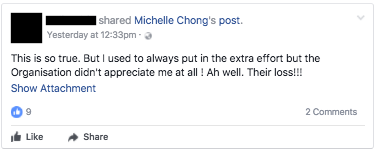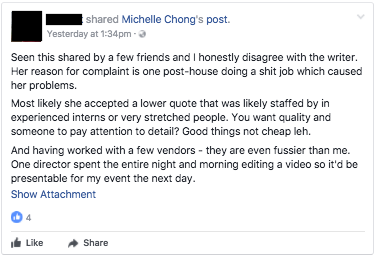A few days ago, Singaporean actress Michelle Chong took to Facebook to air her thoughts on what she perceived as a degeneration of Singaporean attitudes towards their professions. Citing personal experiences, she described how pride in our work, if we care enough to have it, can bring us both pleasure and purpose.
4 months ago, I too wrote an op-ed with the aim of shifting the narrative away from the subject of ‘passion’ towards that of ‘pride’. After all, not all of us are lucky enough to do what we love. But we can decide whether or not to do it properly.
Since then, however, I’ve come to realise that such opinions, publicly aired, don’t really accomplish anything. But more on this in a bit.
While I found myself somewhat agreeing with Chong, I didn’t like how she had set up her arguments.
Never mind her privileged assumptions that we are all “fairly bilingual and well-travelled”, or that we have (presumably equal) “access to information and resources”. Never mind her blanket belief that all of us desire “enjoyment” and “fulfilment” from our jobs, and that “it’s not really about the money” (lucky you!).
Instead, I took issue with how she made it sound like there are only two kinds of Singaporeans: those who care enough to always do their best and those who don’t.
This simply isn’t true.
Most (if not all) of us exist somewhere in between. We have all had moments when we could have done better but, for whatever reason, didn’t. Or maybe we wanted to do better, but just couldn’t see why we should have.
Maybe we were tired, distracted, or honestly just careless. Or maybe some of us are better than others at hiding our negligence.

Unfortunately, this isn’t going to happen.
If you count yourself amongst the lukewarm employees that Chong is probably addressing, all you would’ve really heard from her is, “Look at me, I work so hard and care so much. Why can’t you do the same?”
Instead of trying to see her point, you would have just dismissed it for its preachy and patronising overtones.
Take a tour of the comments section on Chong’s original post and you’ll notice that readers either agreed wholeheartedly, or they made excuses. Conspicuously missing were any commitments to start taking pride in one’s work.
So has Chong succeeded in inspiring any kind of introspection, or has she simply provoked self-righteous finger pointing?
Here’s the lesson I learnt 4 months ago: if you want to influence people, you need to first empathise with them.
Public opinions like these are not helpful when they oversimplify diverse realities. They don’t prompt self-examination, only defensiveness—“How to care about pride when everything is so expensive!?”
They make people feel small, indignant, and less willing to listen.

Accordingly, I decided to put myself in the shoes of a disgruntled worker, the sort that gives zero fucks and just wants to “pass up homework”. In this parallel universe, I am now being lectured by a random famous person. If I were to change my behaviour, what would I actually want to hear that wouldn’t trigger my haughty Singaporean sensibilities?
Maybe something like this:
“I honestly think Singapore would be a better place if people were more supportive of each other. Recently, some things happened to me that made me question whether Singaporeans care about their work. At first, I was angry and frustrated. But after some reflection, I’ve come to realise that it’s not always so simple.
I know that hard work can go unnoticed. Sometimes, other people take credit for what you do. I know that having families and responsibilities means that we end up taking the jobs we can get, and not the jobs we care about. For some of us, learning to care less is how we get through such difficult times. Inevitably, we make mistakes, cut corners, and don’t give our best.
It happens. No one is perfect.
When I was in school, I learnt that only grades and deadlines mattered, not work ethic or having the right attitude. I grew up with a very selfish approach to work. Often I thought to myself, “We are a practical country. If caring too much only hurts me, why do it?”
But today, Singapore is going through a trying time. Many are struggling to get by, and our country faces both economic and political uncertainty. But this is an opportunity—for us to open our eyes and see that we are not alone in our hardship.
Whether we are employees or employers, I think it’s time to pause and ask, “Am I being supportive of those around me? Am I behaving in a way that would allow all of us to do our best work?”
Today, I’ve decided to be less judgmental and more understanding. My hope is that fellow Singaporeans see this not as something to take advantage of, but as something to inspire them to do the same, if not better.
I think we should all take more pride in our work. But I also think that we should take pride in being Singaporean, and in enabling each other so we can all do our best.”






